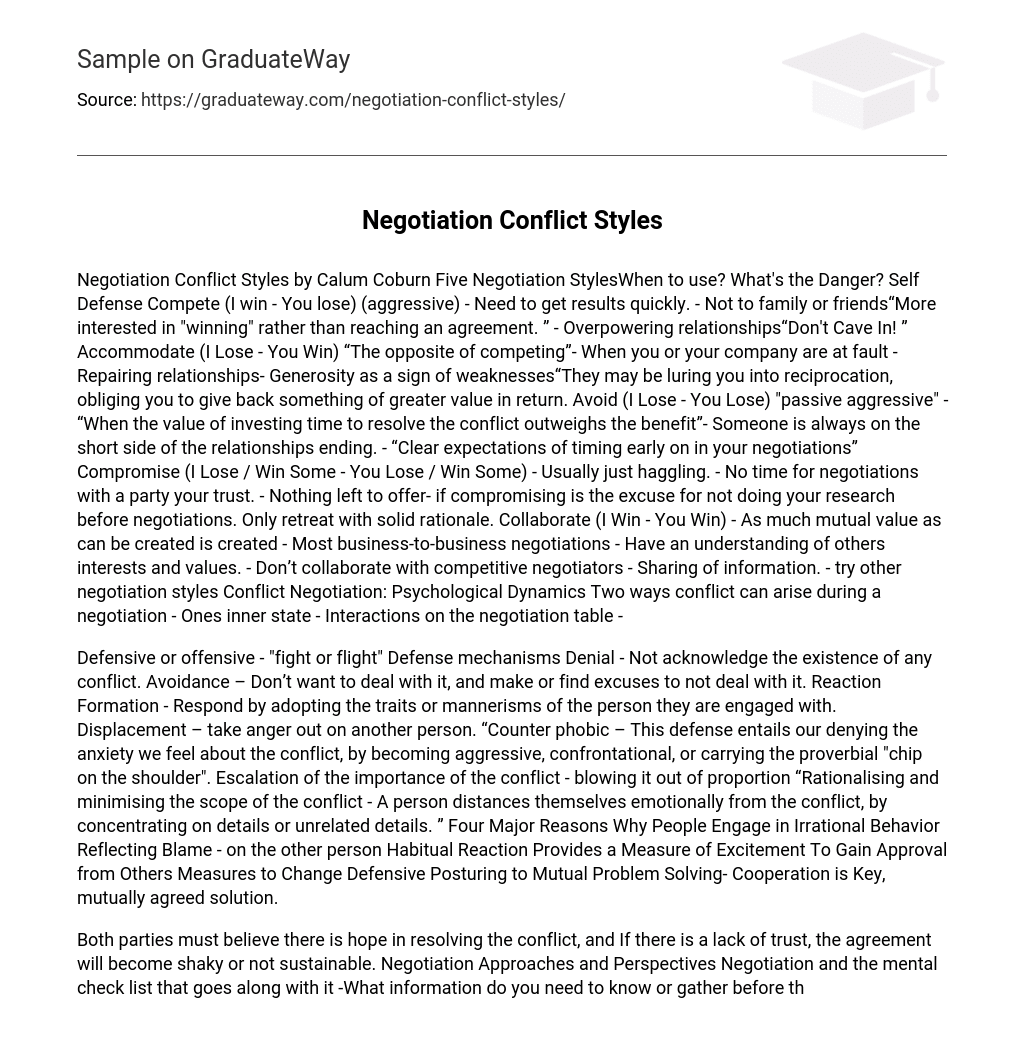Negotiation Conflict Styles by Calum Coburn Five Negotiation StylesWhen to use? What’s the Danger? Self Defense Compete (I win – You lose) (aggressive) – Need to get results quickly. – Not to family or friends“More interested in “winning” rather than reaching an agreement. ” – Overpowering relationships“Don’t Cave In! ” Accommodate (I Lose – You Win) “The opposite of competing”- When you or your company are at fault – Repairing relationships- Generosity as a sign of weaknesses“They may be luring you into reciprocation, obliging you to give back something of greater value in return. Avoid (I Lose – You Lose) “passive aggressive” – “When the value of investing time to resolve the conflict outweighs the benefit”- Someone is always on the short side of the relationships ending. – “Clear expectations of timing early on in your negotiations” Compromise (I Lose / Win Some – You Lose / Win Some) – Usually just haggling. – No time for negotiations with a party your trust. – Nothing left to offer- if compromising is the excuse for not doing your research before negotiations. Only retreat with solid rationale. Collaborate (I Win – You Win) – As much mutual value as can be created is created – Most business-to-business negotiations – Have an understanding of others interests and values. – Don’t collaborate with competitive negotiators – Sharing of information. – try other negotiation styles Conflict Negotiation: Psychological Dynamics Two ways conflict can arise during a negotiation – Ones inner state – Interactions on the negotiation table –
Defensive or offensive – “fight or flight” Defense mechanisms Denial – Not acknowledge the existence of any conflict. Avoidance – Don’t want to deal with it, and make or find excuses to not deal with it. Reaction Formation – Respond by adopting the traits or mannerisms of the person they are engaged with. Displacement – take anger out on another person. “Counter phobic – This defense entails our denying the anxiety we feel about the conflict, by becoming aggressive, confrontational, or carrying the proverbial “chip on the shoulder”. Escalation of the importance of the conflict – blowing it out of proportion “Rationalising and minimising the scope of the conflict – A person distances themselves emotionally from the conflict, by concentrating on details or unrelated details. ” Four Major Reasons Why People Engage in Irrational Behavior Reflecting Blame – on the other person Habitual Reaction Provides a Measure of Excitement To Gain Approval from Others Measures to Change Defensive Posturing to Mutual Problem Solving- Cooperation is Key, mutually agreed solution.
Both parties must believe there is hope in resolving the conflict, and If there is a lack of trust, the agreement will become shaky or not sustainable. Negotiation Approaches and Perspectives Negotiation and the mental check list that goes along with it -What information do you need to know or gather before the negotiation begins? -Analyze information and rank in importance. -How many issues are at hand within the negotiation? -Negotiation style or goals wanted to be achieved -Starting point and where you hope to be in the end -Feel positive and confident about offers made





